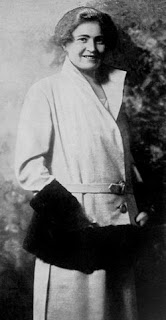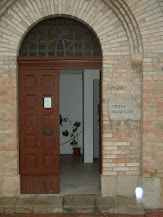Father whose politics were Fascist leader’s early inspiration
 |
| Mussolini's father, Alessandro, by trade a blacksmith, was an active socialist militant |
A blacksmith by profession, he was a revolutionary socialist activist who had a profound influence on his son’s early political leanings. Although his embrace of nationalism was not as full as that of his son, Mussolini senior nonetheless greatly admired Italian nationalist figures such as Carlo Pisacane, Giuseppe Mazzini, and Giuseppe Garibaldi, whom he perceived as having socialist or humanist tendencies.
Regularly in trouble with the police for acts of criminal damage and sometimes violence against opponents, Alessandro was eventually held under house arrest and granted his release only when he announced he wished to marry his girlfriend, a local schoolteacher who was a devout Catholic.
Alessandro was born in a house in Montemaggiore di Predappio that once hosted Giuseppe and Anita Garibaldi as they made their way towards Venice from San Marino. Anita, carrying their fifth child, became ill soon after leaving Montemaggiore and died outside Ravenna.
Although Alessandro had distant noble roots on his father’s side, his own politics were firmly on the left. He declared himself to be a socialist revolutionary at the age of 19 and the following year took part in riots in nearby Predappio.
 |
| Giuseppe Garibaldi was one of Alessandro Mussolini's heroes |
At the heart of his political philosophy was the belief that the means of production should belong to the State and not be privately owned and that society should be governed by committees of workers. He combined his socialist principles with nationalism, driven by his pride at being Italian. His idealistic vision combined Garibaldi-style militarism with Mazzinian nationalist sentiment and humanitarian socialism.
His notoriety as an activist had an impact on his life in many ways. His in-laws, for example, would not grant their approval to his marriage to Rosa Maltoni after he was released from house arrest in 1882, their view of Alessandro not helped by his undisguised contempt for the Catholic church to which his bride, by contrast, was devoted.
He suffered regular periods out of work, too, because prospective employers, aware of his reputation, feared he would be a disruptive influence who might encourage his fellow workers to stage strikes. These periods of idleness led him to drink heavily and he would eventually become an alcoholic.
Nonetheless, his marriage to Rosa produced three children, of whom Benito - named Benito Amilcare Andrea in honour of the Mexican politician Benito Juárez and two Italian revolutionaries, Amilcare Cipriani and Andrea Costa - was their first born, in 1893. Subsequently, Benito acquired a brother, Arnaldo, and a sister, Edvige.
 |
| Rachele Guidi, who was to become Benito's wife |
His involvement in local government ended, however, when he was wrongly arrested on suspicion of inciting riots in Predappio at the time of the local elections in 1902. Despite pleading his innocence, he was kept in custody for six months before a court in Forlì finally acquitted him.
The spell in prison damaged his health, and after Rosa died in 1905 he drifted into relative obscurity. He opened a small tavern on the outskirts of Forlì and became reacquainted with Anna Lombardi, whom he had courted many years earlier, before meeting Rosa. Anna was by now a widow with five daughters. One of them, Rachele Guidi, became enamoured with Benito, by then a young man in his 20s, and would later become his long-suffering wife.
Benito, who had helped his father in the smithy as a boy, listening to Alessandro speak about Karl Marx as well as Pisacane, Mazzini and Garibaldi, at first worked with him too in the inn when his own commitments allowed it. In time, though, Benito was at home less and less and as the work took its toll on Alessandro, who turned increasingly back to the bottle.
He died in 1910, just eight days after his 56th birthday. Almost half a century later, in 1957, members of the Mussolini family arranged for his remains to be moved from their resting place in Forlì to the family mausoleum that Benito had built in 1928 in Predappio, the town of his own birth.
There, Alessandro was reunited with Rosa and Benito himself, who was also buried there in 1957, some 12 years after he was killed by partisans on the shore of Lake Como, when it was agreed the family could hold a funeral. Rachele was interred next to her husband at Predappio following her death in 1979.
 |
| The parish church at Montemaggiore was rebuilt on Benito Mussolini's orders |
Alessandro’s birthplace, Montemaggiore di Predappio, a hamlet which had 100 residents at the last count, is situated about 10km (six miles) from the town of Predappio in Emilia-Romagna, accessed by a road of many hairpin bends that climbs into the Apennines to the west of Predappio. It was once the home of a castle built in the 12th century, the last remains of which disappeared in the 1960s. Nowadays, the only building of note is its parish church, dedicated to Santo Cristofero, that Benito Mussolini had rebuilt in 1939. A well-preserved castle can be seen at Predappio Alta, one of the villages on the road to Montemaggiore. The Rocca di Predappio dates back to the early 10th century and was enlarged in the 15th century, when the addition of formidable walls made it almost impregnable. Thanks to its use largely as a garrison rather than a defensive bulwark, its structure remains almost intact.
 |
| The Mussolini crypt attracts thousands of visitors |
Predappio, where Benito Mussolini was born in 1883, is a small town situated around 18km (11 miles) south of Forlì. After a landslide hit the town in the winter of 1923-24, many people were left homeless, prompting the Italian government to build a bigger, more prestigious township to celebrate the birthplace of Mussolini, following the architectural styles favoured by the emerging Fascist regime. Along with the nearby town of Forlì, Predappio was given the title of La Città del Duce. The Mussolini family mausoleum in a cemetery just outside the town has become one of several attractions in the town for the neofascists who visit in their thousands each year. Visitors may be disturbed by the number of businesses in Predappio openly selling memorabilia celebrating the Fascist regime, although plans by a local mayor to open a Museum of Fascism in the town did not reach fruition.
Also on this day:
1696: The birth of violinist and composer Andrea Zani
1869: The birth of King Victor Emmanuel III
1932: The birth of Germano Mosconi, controversial sports presenter
1961: The birth of actor Luca Zingaretti
No comments:
Post a Comment